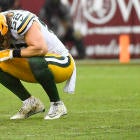Coaches, players, fans, and members of the competition committee have all expressed concerns about the sharp uptick in roughing the passer penalties, but the league has decided to stay the course. No real changes are coming.
On Thursday, two days after various reports indicated that members of the NFL competition committee were "uncomfortable" with the rule as is and would discuss the issue on a conference call, the NFL announced that they won't be making any alterations to the rule or the enforcement of the rule. The emphasis on the body weight portion of the rule, which restricts defenders from landing on a quarterback with their entire body weight and driving a quarterback into the ground with excessive force, will remain in place.
The statement from NFL executive vice president of football operations, Troy Vincent:
The NFL Competition Committee met last night by conference call to discuss the enforcement of roughing the passer rules with a specific emphasis on the use of body weight by a defender. The committee reviewed video of roughing the passer fouls from both this season to date and 2017.
In reiterating its position on quarterback protection, the committee determined there would be no changes to the point of emphasis approved this spring or to the rule, of which the body weight provision has been in place since 1995.
To ensure consistency in officiating the rule, the committee clarified techniques that constitute a foul.
Video feedback will continue to be provided throughout the season to coaches, players and officials illustrating clear example of permissible and impermissible contact on the quarterback.
At the end of that statement, the NFL included a link to a video in which Al Riveron, the league's head of officiating, provides a few examples of legal and illegal contact on quarterbacks. The first play is the hit on Packers quarterback Aaron Rodgers -- via Vikings linebacker Anthony Barr -- that broke his collarbone and forced him to miss much of last season. Barr wasn't flagged at the time, but Riveron made it clear that it would be a penalty today. And for what it's worth, some Packers players -- like Clay Matthews and Ha Ha Clinton-Dix -- did criticize Barr for that hit at the time.
The video goes on to show more examples, none of which will likely sway how you feel about the rule, regardless of your initial stance. Missing from the video is the recent hit by William Hayes, who was trying to avoid a penalty under the body weight aspect of the rule and ended up tearing his ACL in the process.
To ensure consistency in officiating the roughing the passer rule, the @NFL Competition Committee clarified techniques that constitute a foul. Examples of permissible and impermissible contact on the quarterback: pic.twitter.com/ODU6FMGeIW
— NFL Football Operations (@NFLFootballOps) September 27, 2018
In so many ways, the hit on Rodgers seems to have been the impetus for the point of emphasis that the league approved in the offseason. Nobody wants to watch the Brett Hundleys of the NFL instead of the Aaron Rodgers of the NFL. The NFL is a quarterback driven league. When Rodgers, Brady and Brees are healthy, the NFL might be the most watchable and exciting league in the world. When they're not healthy and the Hundleys, Osweilers, and Beathards (welcome back!) are forced to fill in, the league becomes nearly unwatchable. In that sense, it's easy to understand the NFL's intent. Protecting quarterbacks (and all players, really) should be one of their top objectives. In so many ways, the future of the sport depends on it.
But as we've seen so far this season, the point of emphasis has led to controversial and costly penalties. Clay Matthews has been flagged twice on hits that appeared to be clean. The biggest issue is that it's difficult for a pass rusher to hit a quarterback and then stop their body from continuing down to the ground with the quarterback. It might not just be difficult. It might be almost impossible.
According to ESPN, officials have already flagged roughing the passer 34 times this season. Through the first three weeks of the 2016 and 2017 season, there were 20 and 16 roughing calls, respectively.
By now, it's clear that the vast majority of the NFL community wants the league to change its stance on the rule. Even some quarterbacks, like Aaron Rodgers, have expressed their concerns. But the league doesn't appear to be on the verge of making any real changes. That shouldn't come as a surprise. The "Dez Caught It" play happened over three-and-half years ago and we still don't really know what a catch is.
Moving forward, coaches would be wise to accept that the rule is the rule, it's not going to change, and it's time to help their players avoid penalties. As Warren Sharp put it on Twitter, "moving forward, as a coach, you can cry about it or you can start ensuring through teaching & play calling you maximize your edges. Doing both is ok, far too few doing the latter."
















